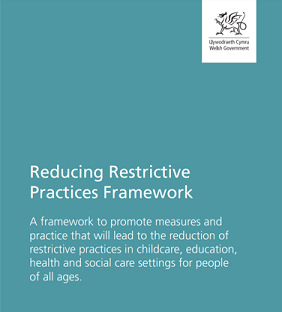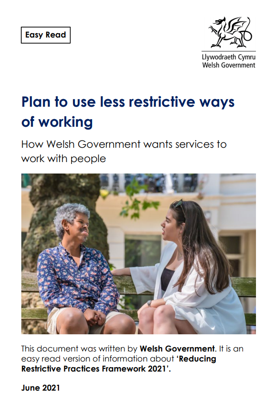Reducing Restrictive Practice in Wales, By David O’Brien & Dr Ruth Wyn Williams, Senior Improvement Managers
Today we welcome the launch of the Reducing Restrictive Practice Framework in Wales by Welsh Government. This framework promotes measures and practices that will lead to the reduction of restrictive practices in childcare, education, health and social care settings.

What we mean by restrictive practice
The Care Council for Wales defines restrictive practices as ‘a wide range of activities that stop individuals from doing things that they want to do or encourages them to do things that they don’t want to do’. They can be very obvious, such as physical restraint, or very subtle, such as blanket restrictions which are more embedded. Welsh Government defines restraint as ‘an act carried out with the purpose of restricting an individual’s movement, liberty and/or freedom to act independently’.
As COVID-19 restrictions ease across Wales and we embrace emerging freedoms, we have probably all reflected on what we value most, with the prospect that at some point restrictions will end. For many people with a learning disability, the experience is different, restrictions existed prior to COVID-19 and will endure beyond the current pandemic.
The Impact of restrictive practices
In Wales, progress has been made over decades of transforming health and social care, to provide appropriate support to people with a learning disability in their local communities – moving away from long stay institutional provision. However, as nurses and throughout our own working lives, restrictive practices have been a recurrent aspect of care and support to people with a learning disability. It is often used as a way to keep people safe and de-escalate those in significant emotional distress and almost always with the best of intentions from dedicated and compassionate people. Whether under legal detention (Mental Health Act), to informal measures reliant on others to decide when a person can go out of the house, choose when to go bed or how and when they spend time with friends and family. Our understanding of the impact of restrictive practices continually grows as we endeavour to capture lived experiences.
Restrictions come in many forms, and we have all experienced some restrictions this year as lockdowns and self-isolation have been put in place to stop the spread of COVID-19. We can all, in some way, reflect on how such restrictions have impacted on us and whilst we cannot make too many comparisons, we can perhaps better understand what it might be like for someone whose restrictions are part of their ongoing support. Emerging evidence indicates that quarantine and nationwide lockdowns, to combat COVID-19, has had a detrimental impact on some people’s mental wellbeing. There is similar evidence that highlights the negative impact that restraint and restrictive interventions can have, both on those who experience it and those who have to deliver restrictive practice.
Mahatma Gandhi said “The true measure of any society can be found in how it treats its most vulnerable members”. What we know is that restrictions are introduced with the intention of reducing harm and keeping people safe. People with a learning disability experience a wide range of restrictions to their daily lives, whether as part of planned care and under a clear legislative framework or as unintentional consequences of measures taken to keep people safe. As with our ongoing public health emergency such restrictions should always be proportionate and a last resort in a series of interventions. A recently published report by the Commons Health and Social Care Committee found that “immediate action” was needed on the use of restrictive practices in England, such as the use of physical restraint, with MPs describing the current situation as a “scandal”. An inquiry into the use of restraint in schools in Wales and England concluded that there is a shortfall in recording instances and that governments should publish nationally agreed definitions of the different types of restraint, building on the definitions in the human rights framework for restraint. Welsh Government’s launch of a framework to reduce restrictive practice in Wales is a positive step forward to addressing the challenges of keeping vulnerable people safe without resorting to restrictions that can undo hard won freedoms and equality.
The Reducing Restrictive Practice Framework for Wales
The launch of this framework in Wales is a milestone in the shift from ensuring that restrictive practices are applied lawfully, as a last resort and safely, to reducing use in the first instance. The framework defines restraint into seven distinct categories that apply to all citizens in Wales across the lifespan and remains a significant step forward. It includes:

- physical restraint
- chemical restraint
- environmental restraint
- mechanical restraint
- seclusion or enforced isolation
- long term segregation
- coercion
This framework is long-awaited and we support its vision to:
- Prevent unnecessary restrictive practice.
- Develop the use of reduction strategies using a human rights approach.
- Work in partnership to reduce the need for restrictive practice in a person-centred process so that, when restrictive practice is unavoidable, safety is ensured for all through prior planning and training.
The Equality and Human Rights Commission said that they look forward to supporting the implementation of the Reducing Restrictive Practice framework, which aligns with the human rights framework. The commission noted that it will be important to evaluate the implementation of the framework.
Improvement Cymru will be working with stakeholders to explore the next steps to support the implementation of the framework. If you would like to get in touch, please email us:
Ruth.Wyn-Williams@wales.nhs.uk
David.O’Brien2@wales.nhs.uk
